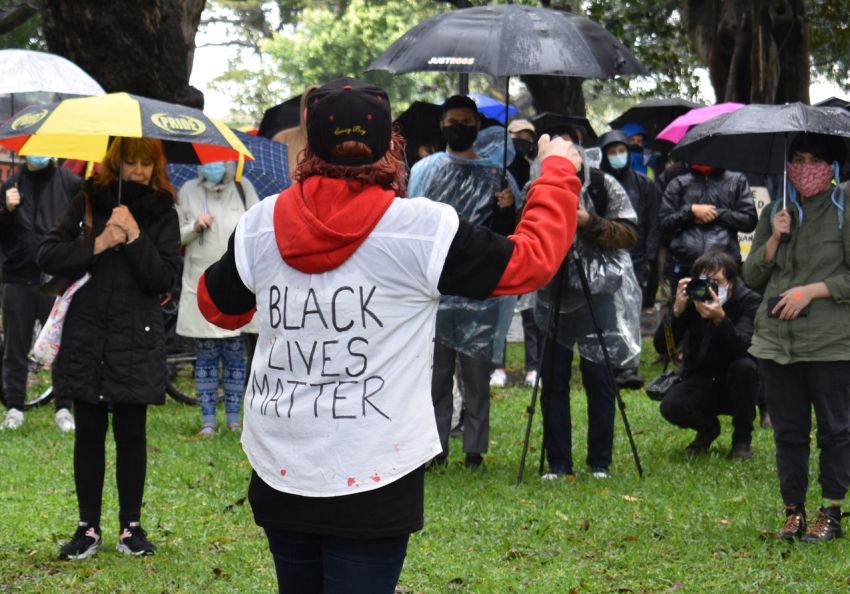
The coronial inquest into the 2018 death of Dunghutti man Nathan Reynolds took place from October 19–28 at the Lidcombe Coroners Court in New South Wales.
The father of one from Rooty Hill in Western Sydney died gasping for breath in a prison cell in the John Morony Complex in Berkshire Park in Western Sydney. He was due to be released that week.
Nathan’s sisters Taleah and Makayla Reynolds, and mother and partner, listened to a litany of evidence of gross medical neglect and prison indifference.
When Nathan was first admitted to prison on May 10, 2018, an intake nurse noted his history of asthma and advised he be properly assessed. Less than a month later, on June 3, he had his first severe asthma attack.
No assessment had been done, and no asthma management plan had been put in place. Registered nurse Parveen Samant distributed medication to him a month later, noting that he still “had not had a chronic disease screening or received an asthma management plan”.
In July that year, Nathan was given six Ventolin puffers. Respiratory specialist Greg King told the inquest on October 28 that this was a “big red flag”, showing something was going wrong with his asthma.
On August 31, Nathan caught a cold and his lung condition deteriorated. Gumbaynggirr, Dunghutti and Bundjalung woman Elizabeth Jarrett, who sat through the inquiry, said that Nathan and other inmates had “desperately called for help on the prison intercom system during his asthma attack”. But it took “between 20-40 minutes for prison guards to respond”.
Prison officer Matthew Fawzy told the inquest on October 20 that he had been trained “not to run to prisoners, only officers”. When nurse Casey Wright finally arrived at Nathan’s cell, despite being told he was having an asthma attack, she injected him with the overdose drug naloxone. Wright also told the court: “You don’t run in an emergency”.
Outside the court Aboriginal Legal Service (NSW/ACT) CEO Karly Warner, who represented the family, said that next year will mark 30 years since the Royal Commission into Aboriginal Deaths in Custody. “On average, one Aboriginal or Torres Strait Islander person has died in police or prison custody every three weeks for 29 years. Hundreds of families have been left behind, in grief, agony and despair since the royal commission.”
Coronial inquests are harrowing. The court hears evidence, but never prosecutes. They operate under the Coroners Act 2009 and examine “unnatural, unexpected, sudden and suspicious deaths to find out what happened and look at how it might be prevented from happening again”.
But no one is ever charged. They are not criminal or civil courts.
The coroner can recommend the Department of Public Prosecution (DPP) lay criminal charges against police, medical staff or prison officers. But the DPP has to agree. The coroner advised the DPP to do this in the case of Yorta Yorta woman Tanya Day, and it refused.
Meanwhile, on October 27, a coronial inquest into the death of 43-year-old Wiradjuri man Dwayne Johnstone took place in a Lismore’s Coroners court and was streamed into Lidcombe Court.
Dwayne was handcuffed and shackled and running from prison officers when he was shot in the back and killed on March 15 near the Lismore base hospital. Coroner Teresa O’Sullivan adjourned the court on October 28, and a day later suspended the inquest and referred the matter to the DPP.
This is unprecedented and a significant advance for the movement to stop deaths in custody in NSW.
His family said on October 29 that “while there is still a long way to go to obtaining closure for the loss” they are “glad that the matter is being taken seriously”.
The turning points have come as the Black Lives Matter movement in New South Wales, which has pushed hard for the right to protest, helped force the state government to amend the COVID-19 Public Health direction, allowing outdoor public gatherings for the express purpose of protesting about a political matter.
On October 26, despite the bad weather, some 200 people gathered in Djarrbarrgalli (Sydney Domain). The rally coincided with the NSW Parliament beginning an inquiry into Aboriginal deaths in custody.
On the first day, NSW Bar Association’s representative and the first Indigenous senior council in Australia Tony McAvoy told the inquiry that imprisonment rates of Aboriginal people in New South Wales are “gross and inhumane” but that solutions already exist.
He said the federal government has had three years to respond to the last major review of Aboriginal incarceration by the Australian Law Reform Commission, but hasn’t. He also said the 1991 royal commission into Black deaths in custody was a good guide on how to “reduce over-incarceration”.
“There are things that can be done now,” McAvoy said.